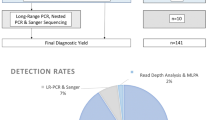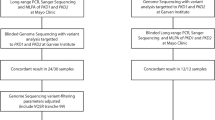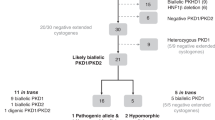Abstract
Polycystic liver disease (PCLD, OMIM 174050) is a dominantly inherited condition characterized by the presence of multiple liver cysts of biliary epithelial origin. Fine mapping established linkage to marker D19S581 (Zmax = 9.65; θ = 0.01) in four large Dutch families with PCLD. We identified a splice-acceptor site mutation (1138–2A→G) in PRKCSH in three families, and a splice-donor site mutation (292+1G→C) in PRKCSH segregated completely with PCLD in another family. The protein encoded by PRKCSH, here named hepatocystin, is predicted to localize to the endoplasmic reticulum. These findings establish germline mutations in PRKCSH as the probable cause of PCLD.
This is a preview of subscription content, access via your institution
Access options
Subscribe to this journal
Receive 12 print issues and online access
$209.00 per year
only $17.42 per issue
Buy this article
- Purchase on Springer Link
- Instant access to full article PDF
Prices may be subject to local taxes which are calculated during checkout


Similar content being viewed by others
Accession codes
References
Qian, Q. et al. Hepatology 37, 164–171 (2003).
Tahvanainen, P. et al. J. Hepatol. 38, 39–43 (2003).
Reynolds, D.M. et al. Am. J. Hum. Genet. 67, 1598–1604 (2000).
The European Polycystic Kidney Disease Consortium. Cell 77, 881–894 (1994).
Mochizuki, T. et al. Science 272, 1339–1342 (1996).
Ward, C.J. et al. Nat. Genet. 30, 259–269 (2002).
Xiong, H. et al. Genomics 80, 96–104 (2002).
Onuchic, L.F. et al. Am. J. Hum. Genet. 70, 1305–1317 (2002).
Hirai, M. & Shimizu, N. Biochem. J. 270, 583–589 (1990).
Sakai, K. et al. Genomics 5, 309–315 (1989).
Curto, M., Frankel, P., Carrero, A. & Foster, D.A. Biochem. Biophys. Res. Commun. 243, 555–560 (1998).
Li, Y.M. et al. Proc. Natl. Acad. Sci. USA 93, 11047–11052 (1996).
Thornalley, P.J. Cell Mol. Biol. (Noisy-le-grand) 44, 1013–1023 (1998).
Trombetta, E.S., Fleming, K.G. & Helenius, A. Biochemistry 40, 10717–10722 (2001).
Acknowledgements
The authors thank the family members for their support and cooperation, Pie Medical for free lending of the mobile ultrasound scanner and H.G. Brunner, M. Boehm and J.C. Zenklusen for advice and inspiring discussions. J.P.H.D. is an Investigator of the Royal Netherlands Academy of Arts and Sciences and recipient of a grant from the Niels Stensen Foundation and of a travel grant from the Netherlands Organisation of Scientific Research. This project was supported in part by an unrestricted educational grant from Schering-Plough Corporation.
Author information
Authors and Affiliations
Corresponding author
Ethics declarations
Competing interests
The authors declare no competing financial interests.
Supplementary information
Rights and permissions
About this article
Cite this article
Drenth, J., te Morsche, R., Smink, R. et al. Germline mutations in PRKCSH are associated with autosomal dominant polycystic liver disease. Nat Genet 33, 345–347 (2003). https://doi.org/10.1038/ng1104
Received:
Accepted:
Published:
Issue Date:
DOI: https://doi.org/10.1038/ng1104
This article is cited by
-
Genetics, pathobiology and therapeutic opportunities of polycystic liver disease
Nature Reviews Gastroenterology & Hepatology (2022)
-
A comparative analysis of differentially expressed mRNAs, miRNAs and circRNAs provides insights into the key genes involved in the high-altitude adaptation of yaks
BMC Genomics (2021)
-
PRKCSH contributes to tumorigenesis by selective boosting of IRE1 signaling pathway
Nature Communications (2019)
-
Pathobiology of inherited biliary diseases: a roadmap to understand acquired liver diseases
Nature Reviews Gastroenterology & Hepatology (2019)
-
Polycystic kidney disease
Nature Reviews Disease Primers (2018)



